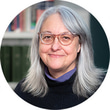- OT
- Professional support
- AOP
- “The AOP wants to show the impact that optometrists have at every stage in a person’s life”
Perspectives
“The AOP wants to show the impact that optometrists have at every stage in a person’s life”
AOP policy advisor, Kathy Jones, discusses the importance of raising the profile of the role of the optometrist with the public across the whole life course

24 February 2023
What is highest in people’s minds at the moment? What are they most worried about? And where does looking after their eyes come in the list of priorities?
We might be distracting ourselves with the latest news from Love Island, the speculation around which crown Camilla will wear to the coronation, or the Six Nations rugby (especially if we’re Scottish). And while, positively, it looks like the UK might avoid a recession after all, there is still more than enough grim news around to keep us worried: whether it’s energy prices, shortages on supermarket shelves, the war in Ukraine, interest rates, strikes, the crisis in the health service, or the cost of living… but what about eye care?
The public thinks highly of the service they receive from optometrists and dispensing opticians: the data informs us so. The GOC’s 2022 public perceptions survey reported that around 95% of respondents express high satisfaction with their experience at an optical practice every year, for example. These high satisfaction levels reflect well on the profession, but they are not matched by high levels of knowledge about the clinical role of the optometrist.
The GOC survey, which is performed annually, also asks respondents what they would do if they woke up with an eye problem. In 2015 only 19% of people said they would think first of going to an optometrist. By 2022 this figure had risen to 34%. And while that is a healthy increase, perhaps reflecting comprehensive coverage in Scotland and Wales as well as growing numbers of minor eye condition services (MECS) and COVID-19 urgent eyecare services (CUES) in England, it’s still only a third of the population.
The role of the optometrist
It intrigues me how few people know what an optometrist is. The term optician is much more recognised, and that is why many practices choose to use it on their signs or in their business names. That is understandable, and conveys well the dispensing side of the role. But it does reinforce the public’s perception of optics as a retail experience more than a healthcare setting.
Sadly, we know from the AOP’s own public opinion survey that when people are worrying about money, they are likely to postpone getting a sight test or purchasing new glasses. Two-thirds of those surveyed said that they were putting off a sight test due to their fears about the cost. And of course, some of those will be missing a chance to get an early, and potentially sight-saving, diagnosis of disease.
This isn’t going to get better, despite the more positive than expected news about the economy.
Eye care through the ages
So how do we raise the profile of optometry and encourage people to enter the doors of their local optometric practice? The AOP can’t change opinions overnight, but we do continue to work hard to change people’s perceptions and increase their knowledge.
Our cost of living campaign was covered in over 40 radio broadcasts, 12 national newspapers and 130 local newspapers, giving us the chance to talk about the importance of a sight test for the detection of disease, and reminding people that many will be able to get General Ophthalmic Services sight tests and support towards the cost of their glasses.
We need to do more, however. Particularly to show people the importance of the one-to-one relationship with the expert optometrist.
The AOP wants to show the impact that optometrists have at every stage in a person’s life (the whole life course), from birth to old age. We want to show the difference that it makes for a child to see clearly at school, the way that specialist eyewear can enhance people’s experience of both work and leisure, and how optometrists diagnose disease and secure onward care at hospital.
We also want to showcase some of the more specialist work optometrists do, like providing eyewear for people with special requirements, or some of the charitable work that optometrists do for people who are excluded from healthcare, such as homeless people.
If you have interesting stories to share about the work you do with patients across different age groups, particular groups in society, or people with special eyewear requirements, please contact the AOP’s policy team on: [email protected]
About the author
Kathy Jones is a policy advisor at the AOP.
Advertisement
More Perspectives
-
“As a profession we are more open to the idea of lifelong learning than ever before”
-
“At the end of the first year of the cycle, what should registrants have done?”
-
“We’re hoping Villa Vision will win further funding in order to enable us to continue this work”
-
“The sector has significantly evolved since the Act was originally passed”


Comments (0)
You must be logged in to join the discussion. Log in